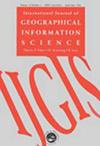从非结构化中文文本中识别细粒度高速公路位置参考的深度学习方法
IF 5.1
1区 地球科学
Q1 COMPUTER SCIENCE, INFORMATION SYSTEMS
International Journal of Geographical Information Science
Pub Date : 2024-01-09
DOI:10.1080/13658816.2023.2301316
引用次数: 0
摘要
在非结构化文本中,复杂的嵌套和不连续的位置参考信息很常见。提取它们对于准确的位置信息检索和空间推理至关重要。然而,传统的位置信息检索方法并不能解决这个问题。本文章由计算机程序翻译,如有差异,请以英文原文为准。
A deep learning approach to recognizing fine-grained expressway location reference from unstructured texts in Chinese
Complex nested and discontinuous location references are common in unstructured text. Extracting them is essential for accurate location information retrieval and spatial inference. However, tradit...
求助全文
通过发布文献求助,成功后即可免费获取论文全文。
去求助
来源期刊
CiteScore
11.00
自引率
7.00%
发文量
81
审稿时长
9 months
期刊介绍:
International Journal of Geographical Information Science provides a forum for the exchange of original ideas, approaches, methods and experiences in the rapidly growing field of geographical information science (GIScience). It is intended to interest those who research fundamental and computational issues of geographic information, as well as issues related to the design, implementation and use of geographical information for monitoring, prediction and decision making. Published research covers innovations in GIScience and novel applications of GIScience in natural resources, social systems and the built environment, as well as relevant developments in computer science, cartography, surveying, geography and engineering in both developed and developing countries.

 求助内容:
求助内容: 应助结果提醒方式:
应助结果提醒方式:


